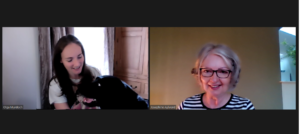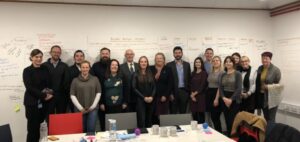Student Experience Mapping
To find out more about the Student Experience Mapping project, I chatted to Olga Murdoch recently.
 JA: I’m a complete newcomer to the concept of Student Experience Mapping, I’d love to find out more about it! Thank you for meeting me today – and its lovely to meet Maci, your beautiful black lab!
JA: I’m a complete newcomer to the concept of Student Experience Mapping, I’d love to find out more about it! Thank you for meeting me today – and its lovely to meet Maci, your beautiful black lab!
Tell me, what is Experience Mapping?
OM: Experience mapping is a technique that we used to help us understand how our students feel about their experience of UCD, from their own perspective. The big difference between this and other approaches for getting student feedback, such as surveys, is that with experience mapping we are not starting with a specific agenda. Students are asked broad, open questions …“what is it like to be a UCD student?” and the probing that follows is based on the direction the students themselves lead the conversation. The result is that what we hear about is what is most important to students at that time.
JA: What was your aim when you started the project?
OM: We launched the project in January 2019 with two goals in mind:
- To learn about students’ experiences with a view to future action/change
- To see if experience mapping is a good way to catalyse cross-domain change
With the help of about 200 staff/academics and students we did just that. Because of what we learned from student experience mapping, three projects were delivered resulting in over 20 action items which will directly impact the student experience. With this outcome it strikes me that experience mapping is in fact a good way to make change happen.
There is more information about the project on the Agile website.
JA: What did you learn about students’ experience of UCD?
OM: Lots! There is a handy condensed version of what we learned on the Agile website. The interesting thing is that we learned things that, collectively, UCD staff and academics already know about. The power of what we have produced is that it is the first time – that I know of – that we have had it in a single place, and straight from the source.
A key learning that we should all remember is that students ‘live and learn as one’ – they don’t differentiate between their living and learning experience in the same way our organisational structure does. I think that’s a really important one to remember when we are working on anything that impacts students.
JA: I saw a reference to ‘Trusted Person’ – can you tell me what this is?
Good question! A Trusted Person is someone in the UCD community who a student turns to when they need support or direction. A Trusted Person can be anyone – staff, academics, other students – regardless of whether they are in a role with student support responsibilities. One of the things we learned from the mapping exercise is that students preference is to turn to a Trusted Person, when they have a need. Having recognised this important role, one of the projects that was then delivered was the ‘Trusted Person’ project. Staff from across the university came together to define the principles of a Trusted Person and create supports to help them to be successful. For example, a map of UCD supports and how to connect with them. The map is currently with a graphic designer – we can’t wait for you to see it!
JA: What were the other two projects?
OM: ‘Findability’ and ‘Shaping Living and Learning’. As you can imagine with 20 actions coming up there is still lots going on but I’ll give you a snippet..
‘Findability’ looked at how to make it easier to connect students with the information and support they need when they need it. This project shares its objective with the USM Roll Out Team – who has started a knowledge sharing group that will help staff better communicate with students. Work is also being done to provide a single landing page that contains all a student needs to know; and to look into the value of using chatbots and personalisation to improve the ‘findability’ of information for students. There are synergies between this project and ‘Shaping Living and Learning’ which can be seen in the work of Estate Services and their new FAQ engine.
‘Shaping Living and Learning’ looked at how to help students to make the best use of campus with respect to their own unique needs. The outcome of this work includes everything from microwaves to more plugs in the library and to increased access to informal study spaces. Students were delighted to learn the Library has introduced automatic renewals and adapted the short loan collection to reduce the occurrence of fines for late returns.
JA: How has the current situation (remote working and COVID-19) impacted on the project?
OM: I’m glad you asked! The learnings were from conversations with students in February 2019 – obviously a lot has changed since then!
When COVID hit, the three projects had completed and the action areas had just been brought to UMT SEG who were acting as a steering group. Needless to say – the project leads focussed on immediate needs, as the UCD community responded to the change to work from home. When some time had passed, myself, the three project leads and the Dean of Students came together to review the action areas. We still have 20 action areas but some of the items had been escalated as they were even more important to students now – and some were delayed as COVID-19 makes them significantly more complex.
For example a temporary landing page was created so students could find out how to quickly access UCD supports and amenities. This work was based on the supports map from the Trusted Person project and is the first step towards the landing page promised by the Findability project. In the Shaping Living and Learning project, informal study spaces were opened up for use by students – taking the burden off the Library with its’ reduced capacity.
Beyond the projects – the value of the Student Perspective lives on as it continues to be used to frame conversations shaping how staff respond to students’ needs. This has proven particularly useful to the ‘Remote Working Group’, a group of College, School and Support Unit staff who have been meeting weekly since March, coordinated by the Unified Support Model Roll-out Team. These conversations, focused by the student perspective, have helped keep local efforts joined up whilst working in the Distributed Office.
JA: Thank you Olga, it has great talking to you!
OM: Always a pleasure!
Credit needs to be given to all the staff, academics and students who were involved in each of the projects. In particular Aisling O’Grady, Peter Hickey, Pia Pollotto and Ciaran Bennett who are leading on the Trusted Person, Findability, and Shaping Living and Learning projects.
Thanks also to the Student Experience Mapping project team who helped make all this happen: Aisling O’Grady, Emma Caron, Irene Rose, Kieran Moloney, Lynn Foster, Mags D’Arcy, Peter Hickey (and of course the sponsors Jason Last and PJ Barron, along with the Project Steering Committee).
